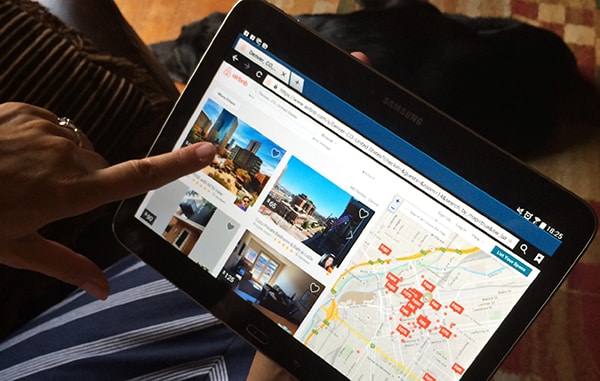Lakewood is close to allowing short-term rentals to operate within the city, with regulations stricter than those in Denver.
A measure before the City Council would let people list their homes on sites such as Airbnb and Vrbo for fewer than 30 days.
“The increased availability of STR platforms, such as Airbnb, VRBO and others has given rise to the need for Lakewood to consider a STR policy,” the ordinance summary reads.
Plenty of people haven’t waited for legalization. A search on Airbnb’s website Tuesday afternoon showed numerous listings within Lakewood city limits, including a handful with more than 100 reviews.
The council did not discuss the proposed ordinance during the first reading when it moved forward with it on Monday, but it will be considered a second and final time Aug. 23 and there will be an opportunity for the public to speak on it.
If approved, the measure would become effective 30 days after it is signed by the mayor, but would not be enforced until March 1, 2022, to give potential license applicants time to come into compliance with the new ordinance.
Lakewood code currently states that lodging facilities must register with the city and must be in specifically-zoned areas.
Lakewood’s proposed ordinance, as it is currently written, is stricter than Denver’s. For one, only single-family homes would be allowed to be rented; Denver allows short-term rentals anywhere that’s residentially zoned.
Lakewood is proposing license applicants provide a minimum of two off-street parking spots for each short-term rental property and they must give notice within 10 days to all neighbors who live within a 250-foot radius of them that they are applying.
No short-term rental properties in Lakewood would be allowed to operate within 300 feet of one another. If there are two applicants within 300 feet of each other, the city clerk could award the license based on a lottery system, but the rule regarding that scenario is still being drafted.
Denver does not require any of those provisions.
Lakewood would also require proof of an in-person home inspection before a license is issued. Denver does not, although the capital city requires short-term rentals to have smoke detectors and fire extinguishers.
Denver officials said the key component to that city’s ordinance is that people can only rent out their “primary residence,” which is intended to preserve the housing stock for long-term tenants, as well as make hosts more accountable to their neighbors.
Lakewood’s ordinance would also only allow people to rent out their primary residences.
Current trends in Denver’s short-term rental active licenses show tourism may be returning to the city and possibly the metro area, Department of Excise and Licenses spokesman Eric Escudero said.
Data he provided BusinessDen shows the city’s active licenses for short-term rentals have risen 9 percent since the start of 2021, but they’re still down 21 percent from March 2020, when the COVID-19 pandemic first hit the city.
Lakewood is close to allowing short-term rentals to operate within the city, with regulations stricter than those in Denver.
A measure before the City Council would let people list their homes on sites such as Airbnb and Vrbo for fewer than 30 days.
“The increased availability of STR platforms, such as Airbnb, VRBO and others has given rise to the need for Lakewood to consider a STR policy,” the ordinance summary reads.
Plenty of people haven’t waited for legalization. A search on Airbnb’s website Tuesday afternoon showed numerous listings within Lakewood city limits, including a handful with more than 100 reviews.
The council did not discuss the proposed ordinance during the first reading when it moved forward with it on Monday, but it will be considered a second and final time Aug. 23 and there will be an opportunity for the public to speak on it.
If approved, the measure would become effective 30 days after it is signed by the mayor, but would not be enforced until March 1, 2022, to give potential license applicants time to come into compliance with the new ordinance.
Lakewood code currently states that lodging facilities must register with the city and must be in specifically-zoned areas.
Lakewood’s proposed ordinance, as it is currently written, is stricter than Denver’s. For one, only single-family homes would be allowed to be rented; Denver allows short-term rentals anywhere that’s residentially zoned.
Lakewood is proposing license applicants provide a minimum of two off-street parking spots for each short-term rental property and they must give notice within 10 days to all neighbors who live within a 250-foot radius of them that they are applying.
No short-term rental properties in Lakewood would be allowed to operate within 300 feet of one another. If there are two applicants within 300 feet of each other, the city clerk could award the license based on a lottery system, but the rule regarding that scenario is still being drafted.
Denver does not require any of those provisions.
Lakewood would also require proof of an in-person home inspection before a license is issued. Denver does not, although the capital city requires short-term rentals to have smoke detectors and fire extinguishers.
Denver officials said the key component to that city’s ordinance is that people can only rent out their “primary residence,” which is intended to preserve the housing stock for long-term tenants, as well as make hosts more accountable to their neighbors.
Lakewood’s ordinance would also only allow people to rent out their primary residences.
Current trends in Denver’s short-term rental active licenses show tourism may be returning to the city and possibly the metro area, Department of Excise and Licenses spokesman Eric Escudero said.
Data he provided BusinessDen shows the city’s active licenses for short-term rentals have risen 9 percent since the start of 2021, but they’re still down 21 percent from March 2020, when the COVID-19 pandemic first hit the city.

